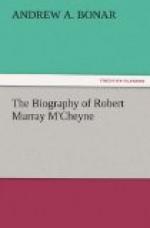And spring adorns
The sunny morns
With opening flowers;
Upon the cross;
And thought the
loss
Of all that earth
Contained—of
mirth,
Of loves, and
fame,
And pleasures’
name—
No sacrifice
To win the prize,
Which Christ secured,
When He endured
For us the load—
The wrath of God!
With many a tear,
And many a fear,
With many a sigh
And heart-wrung
cry
Of timid faith,
Where intervenes
No darkening cloud
Of sin to shroud
The gazer’s
view.
Thus sadly flew
The merry spring;
And gaily sing
The birds their
loves
In summer groves.
But not for him
Their notes they
trim.
His ear is cold—
His tale is told.
Above his grave
The grass may
wave—
The crowd pass
by
Without a sigh
Above the spot.
They knew him
not—
They could not
know;
And even though,
Why should they
shed
Above the dead
Who slumbers here
A single tear?
I cannot weep,
Though in my sleep
I sometimes clasp
With love’s
fond grasp
His gentle hand,
And see him stand
Beside my bed,
And lean his head
Upon my breast,
O’er lawn
and mead;
Its virgin head
The snowdrop steeps
In dew, and peeps
The crocus forth,
Nor dreads the
north.
But even the spring
No smile can bring
To him, whose
eye
Sought in the
sky
For brighter scenes.
And bid me rest
Nor night nor
day
Till I can say
That I have found
The holy ground
In which there
lies
The Pearl of Price—
Till all the ties
The soul that
bind,
And all the lies
The soul that
blind,
Be
Nothing could more fully prove the deep impression which the event made than these verses. But it was not a transient regret, nor was it the “sorrow of the world.” He was in his eighteenth year when his brother died; and if this was not the year of his new birth, at least it was the year when the first streaks of dawn appeared in his soul. From that day forward his friends observed a change. His poetry was pervaded with serious thought, and all his pursuits began to be followed out in another spirit. He engaged in the labors of a Sabbath school, and began to seek God to his soul, in the diligent reading of the word, and attendance on a faithful ministry.




